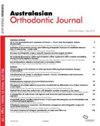Unbalanced cartilage calcification during development contributes to the formation of irregular articular surfaces as revealed by micro-CT images
IF 0.9
4区 医学
Q4 DENTISTRY, ORAL SURGERY & MEDICINE
引用次数: 0
Abstract
Abstract Introduction The histological features of irregular mandibular condylar surfaces revealed on CT images remain unknown. Aim In order to seek clarification, the aim of the study was to describe the histological features of irregular mandibular condylar surfaces detected on micro-CT images. Materials and methods Due to different modelling requirements, thirty rats were exposed to five experimental occlusal disturbance models at 6- or 8-weeks of age. Another six age-matched rats were used as controls. After 10 or 12 weeks of modelling, the mandibular condyles were sampled for micro-CT scanning and histology, immunohistochemistry and immunofluorescence assessment. The condyles with irregular surface signs were chosen for analysis. Results Based on the micro-CT images, 10 out of the 30 condyles were diagnosed as having irregular articular surfaces which typically appeared as lacunae on histological sections. The lacunae were filled with degraded cartilage, a fibrous mass, or calcified islets. Type II collagen-, type X collagen- and osterix-positive cells were observed at the side walls of the lacunae. Cleaved caspase-3-positive cells, CD90-positive cells and fibronectin-positive areas were observed inside the lacunae. However, in the subchondral bone at the lower margin of the lacunae, TRAP-positive cells were seldom observed. Conclusions Irregular mandibular condylar surfaces revealed by micro-CT images during development appeared to be a result of unbalanced cartilage calcification.微ct图像显示,发育过程中不平衡的软骨钙化导致不规则关节面形成
摘要:下颌髁突表面不规则的CT表现的组织学特征尚不清楚。目的为了寻求澄清,本研究的目的是描述在显微ct图像上检测到的不规则下颌髁突表面的组织学特征。材料与方法30只大鼠,根据不同的造模要求,分别在6、8周龄时进行5种实验性咬合障碍模型的实验。另外6只年龄匹配的大鼠作为对照。造模10周或12周后,取髁突标本进行显微ct扫描、组织学、免疫组织化学和免疫荧光检测。选择表面有不规则征象的髁进行分析。结果30个髁的显微ct图像中,有10个被诊断为不规则关节面,在组织学切片上表现为典型的腔隙。腔隙充满退化的软骨、纤维团块或钙化的胰岛。腔隙侧壁可见II型胶原、X型胶原及固相阳性细胞。腔隙内可见裂解的caspase-3阳性细胞、cd90阳性细胞和纤维连接蛋白阳性区。然而,在腔隙下缘的软骨下骨中,很少观察到trap阳性细胞。结论发育过程中微ct图像显示的下颌髁突表面不规则可能是软骨钙化不平衡的结果。
本文章由计算机程序翻译,如有差异,请以英文原文为准。
求助全文
约1分钟内获得全文
求助全文
来源期刊

Australasian Orthodontic Journal
Dentistry-Orthodontics
CiteScore
0.80
自引率
25.00%
发文量
24
期刊介绍:
The Australasian Orthodontic Journal (AOJ) is the official scientific publication of the Australian Society of Orthodontists.
Previously titled the Australian Orthodontic Journal, the name of the publication was changed in 2017 to provide the region with additional representation because of a substantial increase in the number of submitted overseas'' manuscripts. The volume and issue numbers continue in sequence and only the ISSN numbers have been updated.
The AOJ publishes original research papers, clinical reports, book reviews, abstracts from other journals, and other material which is of interest to orthodontists and is in the interest of their continuing education. It is published twice a year in November and May.
The AOJ is indexed and abstracted by Science Citation Index Expanded (SciSearch) and Journal Citation Reports/Science Edition.
 求助内容:
求助内容: 应助结果提醒方式:
应助结果提醒方式:


